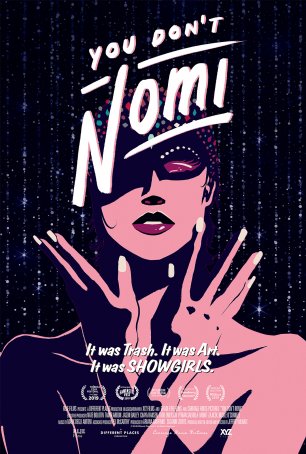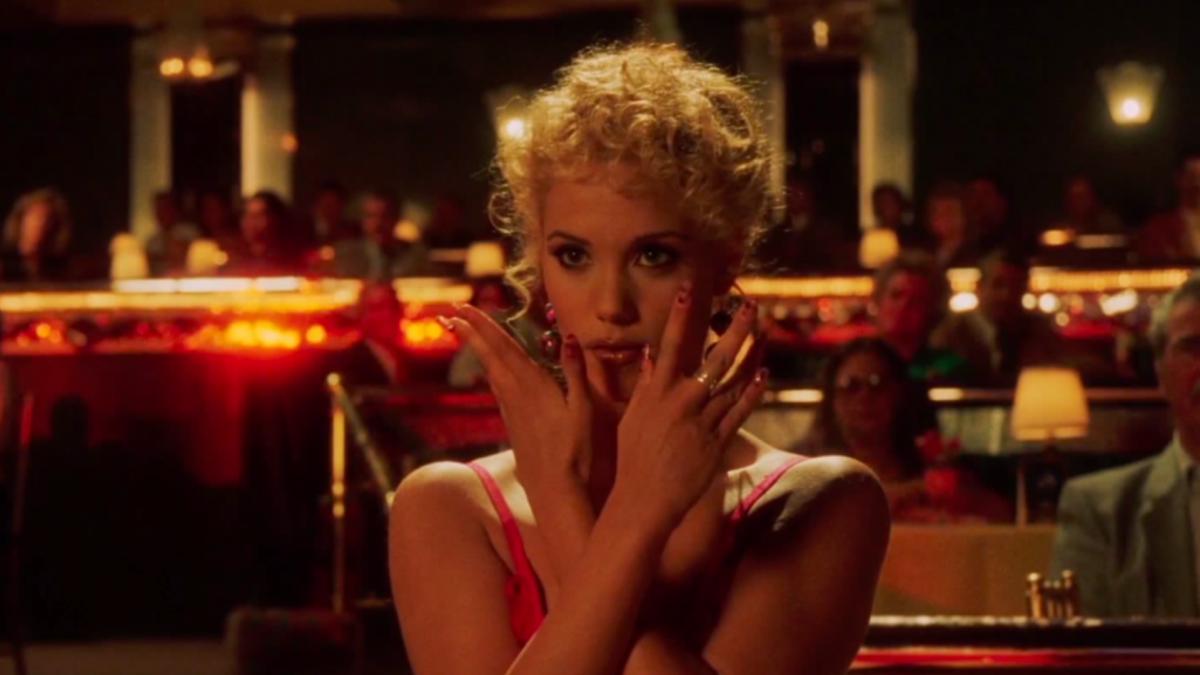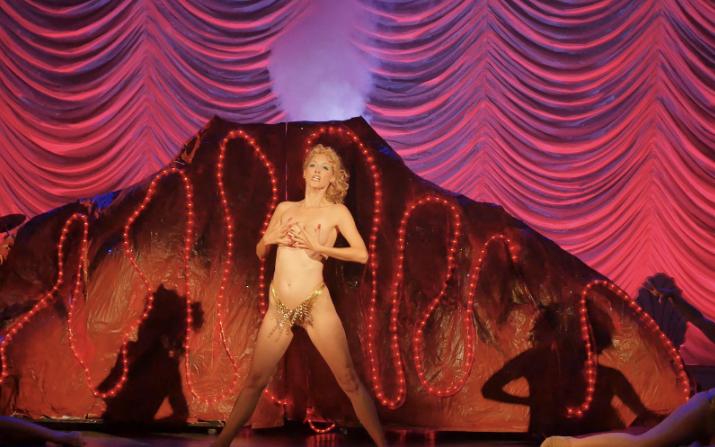You Don't Nomi (United States, 2019)
July 07, 2022
You Don’t Nomi is a 2019 documentary that takes a
fond look back at the deservedly derided Paul Vehoeven/Joe Eszterhas box office
bomb, Showgirls. Although director Jeffrey McHale approaches the retrospective
from a decidedly subjective point-of-view, the revisitation isn’t entirely
one-sided. You Don’t Nomi attempts to explore whether Showgirls
is truly as bad as its reputation (and 1995 theatrical performance) would
suggest. The movie posits three possibilities: (1) Showgirls is a bad
movie, (2) Showgirls, like many a “cult-classic,” falls into the “so bad
it’s good” category, or (3) Showgirls is actually a good movie whose
sly, subversive social commentary was almost universally missed or overlooked.
You Don’t Nomi operates from a faulty premise,
however. It wrongly assumes that, over the course of the 25+ years since Showgirls’
arrival, there has been a mass shift in popular and critical thought
regarding the movie. That’s not the case. Without a doubt, Showgirls has
become a true “cult classic” but, as the very term implies, its widespread acceptance
isn’t mainstream. A small but devoted group of true believers have come to
accept the film in much the same way that dedicated cliques have developed
around the likes of The Rocky Horror Picture Show and Plan 9 from Outer Space. It’s often more about the overall experience than the actual quality
of the movie. And, although some critics have softened in their views (or even
flipped), that doesn’t constitute a majority.
 McHale’s defense of Showgirls is passionate, although
he does allow (and give voice to) the perspective that it’s simply a poorly-conceived,
badly-made atrocity. Mostly, however, he focuses on the other two possibilities,
giving by far the most screen time to the interpretation that the movie is actually
a biting satire and social/cultural commentary that uses graphic sex and nudity
to unsettle viewers. This theory goes on to say that the awful acting isn’t the
result of limited talent on the part of (in particular) Elizabeth Berkeley but
a conscious choice made by Verhoeven to amplify the movie’s intentions.
McHale’s defense of Showgirls is passionate, although
he does allow (and give voice to) the perspective that it’s simply a poorly-conceived,
badly-made atrocity. Mostly, however, he focuses on the other two possibilities,
giving by far the most screen time to the interpretation that the movie is actually
a biting satire and social/cultural commentary that uses graphic sex and nudity
to unsettle viewers. This theory goes on to say that the awful acting isn’t the
result of limited talent on the part of (in particular) Elizabeth Berkeley but
a conscious choice made by Verhoeven to amplify the movie’s intentions.
Viewed in isolation, with only the numerous clips (many
containing lengthy glimpses of the reason Showgirls received an NC-17 in
the first place) to accompany the talking heads commentary, it would seem that
there might be some validity to this stance. On an intellectual level, it makes
sense. The problem is, it falls apart if you re-watch Showgirls from start
to finish. There’s an old saying that applies here: If it walks like a duck and
quacks like a duck, it probably is a duck. Defenders of cult movies tend to be
intelligent and eloquent and You Don’t Nomi qualifies as both.
 One obvious (albeit understandable) deficit in this retrospective
rehabilitation relates to the involvement (or lack thereof) of cast and crewmembers
of the theatrical production. The best McHale could achieve was the
participation of April Kidwell, who played Nomi in the 2013 Off-Broadway
musical adaptation/parody, Showgirls! The Musical. However, she is more open
discussing the show’s value to her as a way to work through past issues than contemplating
its artist merit.
One obvious (albeit understandable) deficit in this retrospective
rehabilitation relates to the involvement (or lack thereof) of cast and crewmembers
of the theatrical production. The best McHale could achieve was the
participation of April Kidwell, who played Nomi in the 2013 Off-Broadway
musical adaptation/parody, Showgirls! The Musical. However, she is more open
discussing the show’s value to her as a way to work through past issues than contemplating
its artist merit.
As pointed out by almost everyone espousing the idea that Showgirls
did what it was supposed to do is the question of whether the camp and humor
was baked into the text or unintentional. Over the years, writer Joe Eszterhas
has waffled on this issue. Verhoeven hasn’t said much although what he has said
can be parsed in different ways. Although archived clips of both men are used
in You Don’t Nomi, the movie would have been greatly improved by new,
focused interviews. The film’s actors are shown only in old clips. McHale has
dug up a number of older Berkeley appearances. Kyle MacLachlan, who has openly
criticized the film over the years, has almost no presence outside of the Showgirls
excerpts. One assumes that McHale lacked both the funds and the connections to line
up any new interviews but the omission makes You Don’t Nomi seem more amateurish
than might otherwise be the case.
 In order to bolster his defense of Showgirls, McHale
provides a cursory look at Verhoeven’s career, focusing on the filmmaker’s
frequent use of provocative material to elicit reactions. And, while it’s true
that Verhoeven has often used sex, violence, and nudity for reasons other than
pure titillation, his two collaborations (the other being Basic Instinct)
with the more commercially-minded Eszterhas are among the least subversive of
Verhoeven’s career. This is glossed over in You Don’t Nomi and claims of
misogyny leveled at the director are addressed in a murky and unsatisfying
fashion.
In order to bolster his defense of Showgirls, McHale
provides a cursory look at Verhoeven’s career, focusing on the filmmaker’s
frequent use of provocative material to elicit reactions. And, while it’s true
that Verhoeven has often used sex, violence, and nudity for reasons other than
pure titillation, his two collaborations (the other being Basic Instinct)
with the more commercially-minded Eszterhas are among the least subversive of
Verhoeven’s career. This is glossed over in You Don’t Nomi and claims of
misogyny leveled at the director are addressed in a murky and unsatisfying
fashion.
In a knowing way, You Don’t Nomi uses Showgirls’ copious sex and nudity to spice up what otherwise might be a sedate documentary. A lot of the movie’s most notorious moments are presented (not to mention scenes from a bunch of Verhoeven’s other films). I doubt the documentary is likely to change many opinions, though. Although McHale’s theories are interesting to listen to, there’s a smoke-and-mirrors quality to them. One thing is certain, however: You Don’t Nomi is a much better motion picture than the movie it profiles.
You Don't Nomi (United States, 2019)
Cast: Jeffrey Conway, Haley Mlotek, Adam Nayman, David Schmader, Jeffrey Sconce, Paul Verhoeven, April Kidwell, Joe Eszterhas, Elizabeth Berkley
Home Release Date: 2022-07-07
Screenplay: Jeffrey McHale
Cinematography:
Music: Mark De Gli Antoni
U.S. Distributor: RLJE Films
U.S. Release Date: 2020-06-09
MPAA Rating: "NR" (Sexual Content, Nudity, Profanity)
Genre: Documentary
Subtitles: none
Theatrical Aspect Ratio: 1.85:1
- (There are no more better movies of Jeffrey Conway)
- (There are no more worst movies of Jeffrey Conway)
- (There are no more better movies of Haley Mlotek)
- (There are no more worst movies of Haley Mlotek)
- (There are no more better movies of Adam Nayman)
- (There are no more worst movies of Adam Nayman)

Comments